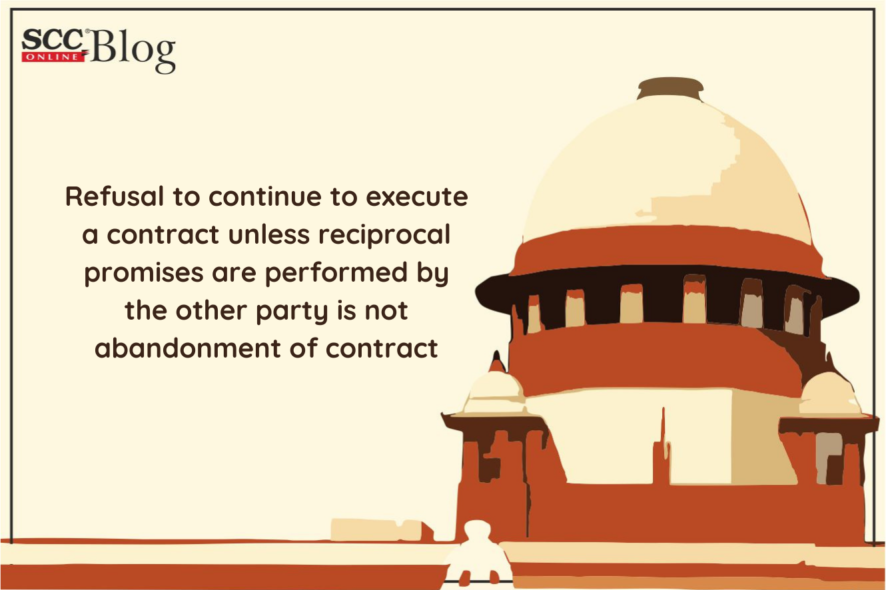Supreme Court: Explaining the law on abandonment on contractual obligation, the bench of Hemant Gupta and V. Ramasubramanian*, JJ has held that the refusal of a contractor to continue to execute the work, unless the reciprocal promises are performed by the other party, cannot be termed as abandonment of contract. A refusal by one party to a contract, may entitle the other party either to sue for breach or to rescind the contract and sue on a quantum meruit for the work already done.
Relevant Facts
- The appellant is a registered contractor with the Government of Maharashtra. In a tender for the execution of the work of Regional Rural Piped Water Supply Scheme for Dabhol-Bhopan and other villages in Ratnagiri District, the appellant became the successful tenderer and was issued with a work order on 03.07.1986, for the execution of the work.
- The time for the completion of the work was stipulated as 30 months but the Respondents issued a letter dated 28.07.1986 informing the appellant that the work order was kept in abeyance.
- The respondents issued another letter dated 02.03.1987 instructing the appellant to stop the pipeline work and start the work at Panchanadi.
- There were issues related to non-payment of bills and the work under the main contract did not start till the second bill was cleared in May, 1987.
- The High Court of Bombay held this as the basis for abandonment of contract.
- This finding was completely contrary to yet another finding that the period of the contract was up to June, 1989 and that the respondents themselves granted extension of time to complete the contract up to 31.12.1989, despite there being no request from the appellant.
- Interestingly, the contract, that was originally to continue till June. 1989, was extended up to December, 1989.
Analysis
The Supreme Court found High Court’s finding erroneous and observed,
“We fail to understand as to how a person who abandoned the contract in May, 1987 could be granted extension of time up to December, 1989 on the very understanding of the respondents that the contract was up to June, 1989.”
The Court held that such a finding of abandonment of contract cannot co¬exist with the specific stand of the respondents that the period of contract was extended up to December, 1989.
The Court explained that the fundamental to the Law of Contract is that whenever a material alteration takes place in the terms of the original contract, on account of any act of omission or commission on the part of one of the parties to the contract, it is open to the other party not to perform the original contract. This will not amount to abandonment.
“Moreover, abandonment is normally understood, in the context of a right and not in the context of a liability or obligation. A party to a contract may abandon his rights under the contract leading to a plea of waiver by the other party, but there is no question of abandoning an obligation. In this case, the appellant refused to perform his obligations under the work-order, for reasons stated by him. This refusal to perform the obligations, can perhaps be termed as breach of contract and not abandonment.”
[Shripati Lakhu Mane v. Maharashtra Water Supply And Sewerage Board, 2022 SCC OnLine SC 383, decided on 30.03.2022]
*Judgment by: Justice V Ramasubramanian
Counsels
For appellant: Senior Advocate Vinay Navare
For Respondent: Advocate Sunil Muraka






